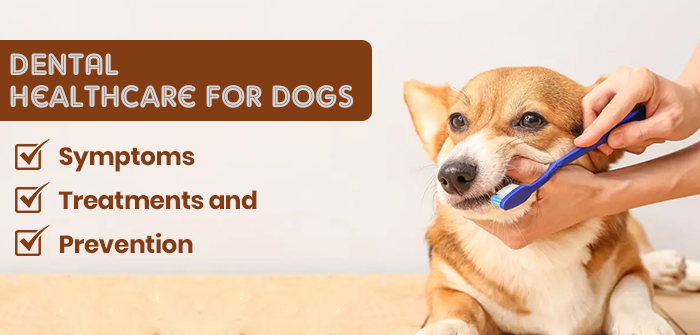Dogs Dental Healthcare: Symptoms, Treatment, and Prevention

It has been observed that dental problem is amongst the top three concerns of a pet parent as observed in a survey. So, as a pet parent, it is your duty to take good care of your pet’s teeth. There are certain symptoms that can tell you that your pet is suffering from dental problems.
Symptoms of Dental Problems in Dogs
- Bleeding from the mouth
- Broken tooth
- Excess salivating (drooling)
- Halitosis (bad breath)
- Loss of appetite, or inability to eat
- Not feeling well
- Pain
- Pus oozing from the mouth or face
- Rubbing at the mouth
- Swollen or bleeding gums
If you find that your pet is suffering from any of the above-mentioned symptoms take them to the vet immediately. Sometimes your pet will not complain about the pain. It is due to the fact that it takes months and sometimes years to reach the level of pain that is shown by pets when they are injured.
The problem is that the pets start living with the pain. This can result in serious consequences and may even reduce their life. Due to toothache the pet may lose its vitality and may show signs of laziness. Sometimes the pet starts reacting like a small puppy. All these signs point toward dental disease.
How does Dental Disease Occur?
Dental disease occurs when the food that your pet eats sticks in his teeth along with bacteria. To prevent this disease, it is extremely crucial to brush the teeth of the pets regularly. There are three major dental diseases: Periodontal disease, Gingivitis, and Caries.
These dental diseases are more prone to certain dog breeds like Chihuahuas, Schnauzers, Maltese Terriers, Toy and Miniature Poodles, German Shepherds, Labradors, and working breeds.
When you find the symptoms of dental disease in your pet take him to the vet and conduct the following examination:
- A general anesthetic, teeth cleaning and polishing,
- Antibiotics and pain relief
- Biopsies
- Blood tests
- Preventative oral hygiene
- X-rays of the teeth
Once the dental disease has been found, it is essential to feed your pet with a diet that is specially formulated for plaque control. Your vet would be the best person to suggest the diet. In the meantime, you can try Advance Adult Dog Dental Large Breed and Hill’s Canine T/D Dental Health.
Also, as suggested earlier brush the teeth of your pets on a daily basis, but do not use a human paste on your pet as it contains ingredients that are harmful to dogs. Try Dentipet Toothpaste on your pet. The last but most important thing is to feed dry food to the pet. This can help in controlling plaque in dogs.
Once the dental disease has been treated practice home dental care problems so that your pet’s teeth always remain in the pink of their health.
How To Know If Your Pet Is Facing Dental Health Problems?
It is important to observe your pet’s oral condition in order to detect any potential issues that might cause discomfort to your pet. There are some signs that can give you a hint that you need to take your pet to the veterinarian. Here are a few of them-
- Persistent bad breath, often unusual, is a common sign that there is something wrong with your pet’s dental health and they may have an infection or a disease.
- Swollen gums and redness is generally a sign of gum disease or infection.
- Drooling or dropping food from the mouth and excessive salivation can be a sign that your pet is experiencing discomfort in their mouth.
- Yellow or brown stains on your pet’s teeth and around the gums can be a result of dental plaque.
- Loss of appetite can be a sign that your pet is unable to chew due to pain or discomfort and thus avoids eating their meals.
- Sudden change in your pet’s behaviour may be a possible cause of dental problems.
In order to prevent dental infections and problems associated with your pet’s oral hygiene, it is crucial for you to take the necessary measures to improve their dental health. Here are some tips that will help you to keep your pet’s teeth healthier:
- Brush your pet’s teeth regularly using pet-friendly dental care products like Petosan Complete Dental Kit, at least one or two times a week. This will help to keep your pet’s mouth free from infections and bad odours.
- Give dental chews and treats like Greenies to your pets, which enhance their dental health. These are administered in the form of tasty chews. Providing treats and toys that promote teeth cleaning can help to remove plaque, tartar buildup and reduces the risk of dental issues.
Read More: https://www.hituponviews.com/paws-and-whiskers-the-ultimate-guide-to-pet-care-and-grooming/








